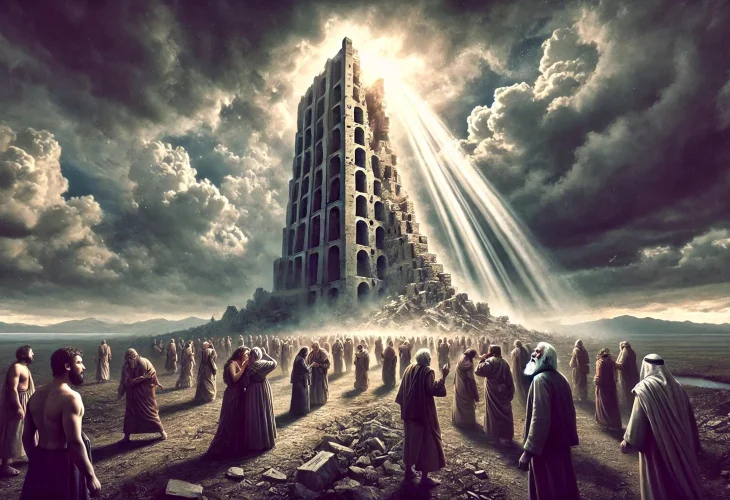Issues in the Bible
The Deeper Meaning of Lech Lecha: From the Tower of Bavel to Avraham’s Revolution of Faith
How Avraham’s journey reshaped humanity’s destiny — replacing humanity’s quest for power with a divine vision of individuality, morality, and spiritual purpose

In this week’s Torah portion, Avraham is commanded, “Lech Lecha — Go forth from your land.” Yet surprisingly, before God even gives this command, Avraham is already on his way. Just a few verses earlier, the Torah tells us: “And Terach took Avram his son, and Lot… and Sarai… and they went forth from Ur Kasdim to go to the land of Canaan, and they came to Charan and settled there.”
So, long before Avraham’s divine mission began, his father Terach was already traveling toward Canaan. Why? And what does this reveal about the larger story unfolding in Bereishit?
The Tower of Bavel: When Unity Became Tyranny
The narrative just before Avraham’s journey is the story of the Tower of Bavel. Humanity was united — “And the whole earth was of one language and one speech.” Together they began to build a massive tower “to reach the heavens.” God declared, “Now nothing will be withheld from them that they plan to do,” and scattered them across the earth, confusing their language.
If we read a few verses earlier, we find that the nations had already split into seventy peoples, each with its own land and tongue. So how could they all be “of one language” at Bavel?
The Torah is describing not a chronological order, but a moral and spiritual one. The dispersion of nations was natural and healthy — each people developing its culture and individuality. But the builders of Babel sought to reverse this, to erase difference and impose a single collective purpose. It was the first attempt at a totalitarian empire: forced unity, uniform thought, and submission to power.
Why God Chose to Scatter Humanity
The generation of the Flood illustrated that when humanity is left unchecked, it drifts toward corruption. Destroying them didn’t solve the problem — evil simply reemerges. So this time, God chose a different path.
Instead of erasing the wicked, He would nurture the good. The divine plan shifted from destruction to cultivation — from top-down punishment to bottom-up moral growth.
The scattering at Bavel was not chaos but mercy. By separating nations, languages, and cultures, God preserved diversity and creativity. Each group could develop freely, think independently, and search for truth. Out of this pluralism, goodness would emerge — not by divine coercion, but by human choice and understanding.
The Seventy Nations and the Empty Land of Canaan
After the Flood, Noach blessed his sons — Shem, Cham, and Yefet — giving each a different destiny. The Torah lists seventy nations descending from them, spread across the world. Strikingly, none of them settled in the land of Canaan’s highlands. That land remained empty, awaiting a nation whose role would be to nurture spiritual awareness and moral repair.
While the builders of Bavel tried to recreate the glory of a lost empire, they built monuments to themselves and sacrificed humanity for progress — just as later totalitarian regimes would do. As the Midrash says, if a brick fell, they wept; but if a worker fell, they did not care. It was the worship of power disguised as unity.
From Bavel to Avraham: A New Kind of Revolution
Terach, Avraham’s father, was still an idolater — but he was also a dissenter. He rejected Bavel’s tyranny and sought a new beginning. He left for Canaan, a land unclaimed by any nation. His son Avraham went further: he broke not only from Bavel but from idolatry itself.
When the king of Bavel tried to force Avraham back into conformity, God took him “out of Ur Kasdim” — out of the fire, both literal and spiritual — and sent him to Canaan. There, Avraham began a revolution not of might but of morality.
Instead of conquering nations, he welcomed strangers. Instead of building towers, he built tents. Through small, consistent acts of kindness, hospitality, and faith, he revealed a new kind of greatness — one rooted in humility and spiritual purpose rather than domination.
The Birth of a New Humanity
This is the deeper meaning of “Lech Lecha — go forth.” It was not just a geographical journey, but a civilizational shift — from empire to ethics, from coercion to conscience. God’s plan for humanity would now unfold not through floods and destruction, but through the quiet influence of one man’s faith.
As God promised: “Through you, all the families of the earth shall be blessed.” And indeed, thousands of years later, most of humanity — through Judaism, Christianity, and Islam — traces its moral and spiritual heritage back to Avraham. What began as a single step away from Ur Kasdim became the first step in humanity’s journey toward moral freedom and divine awareness.
That is the eternal power of Lech Lecha: one man walking away from a tower of human arrogance — and walking toward the light of truth.

